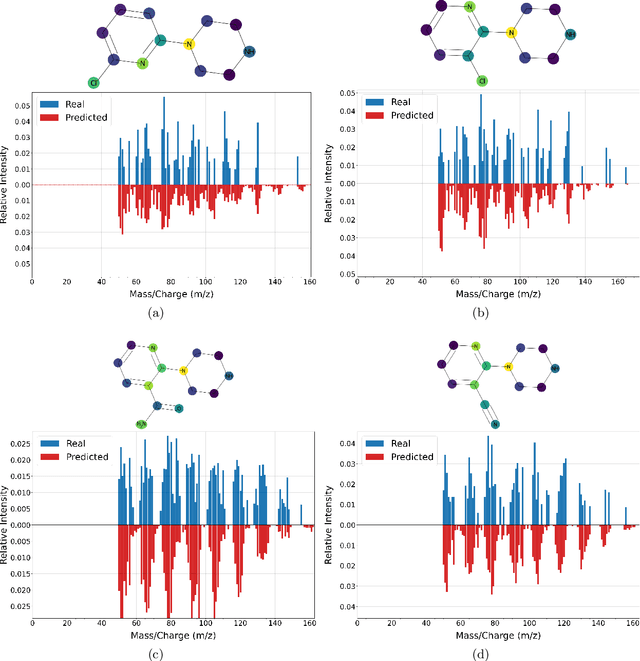Hannes Röst
FraGNNet: A Deep Probabilistic Model for Mass Spectrum Prediction
Apr 02, 2024



Abstract:The process of identifying a compound from its mass spectrum is a critical step in the analysis of complex mixtures. Typical solutions for the mass spectrum to compound (MS2C) problem involve matching the unknown spectrum against a library of known spectrum-molecule pairs, an approach that is limited by incomplete library coverage. Compound to mass spectrum (C2MS) models can improve retrieval rates by augmenting real libraries with predicted spectra. Unfortunately, many existing C2MS models suffer from problems with prediction resolution, scalability, or interpretability. We develop a new probabilistic method for C2MS prediction, FraGNNet, that can efficiently and accurately predict high-resolution spectra. FraGNNet uses a structured latent space to provide insight into the underlying processes that define the spectrum. Our model achieves state-of-the-art performance in terms of prediction error, and surpasses existing C2MS models as a tool for retrieval-based MS2C.
MassFormer: Tandem Mass Spectrum Prediction with Graph Transformers
Nov 15, 2021



Abstract:Mass spectrometry is a key tool in the study of small molecules, playing an important role in metabolomics, drug discovery, and environmental chemistry. Tandem mass spectra capture fragmentation patterns that provide key structural information about a molecule and help with its identification. Practitioners often rely on spectral library searches to match unknown spectra with known compounds. However, such search-based methods are limited by availability of reference experimental data. In this work we show that graph transformers can be used to accurately predict tandem mass spectra. Our model, MassFormer, outperforms competing deep learning approaches for spectrum prediction, and includes an interpretable attention mechanism to help explain predictions. We demonstrate that our model can be used to improve reference library coverage on a synthetic molecule identification task. Through quantitative analysis and visual inspection, we verify that our model recovers prior knowledge about the effect of collision energy on the generated spectrum. We evaluate our model on different types of mass spectra from two independent MS datasets and show that its performance generalizes. Code available at github.com/Roestlab/massformer.
 Add to Chrome
Add to Chrome Add to Firefox
Add to Firefox Add to Edge
Add to Edge